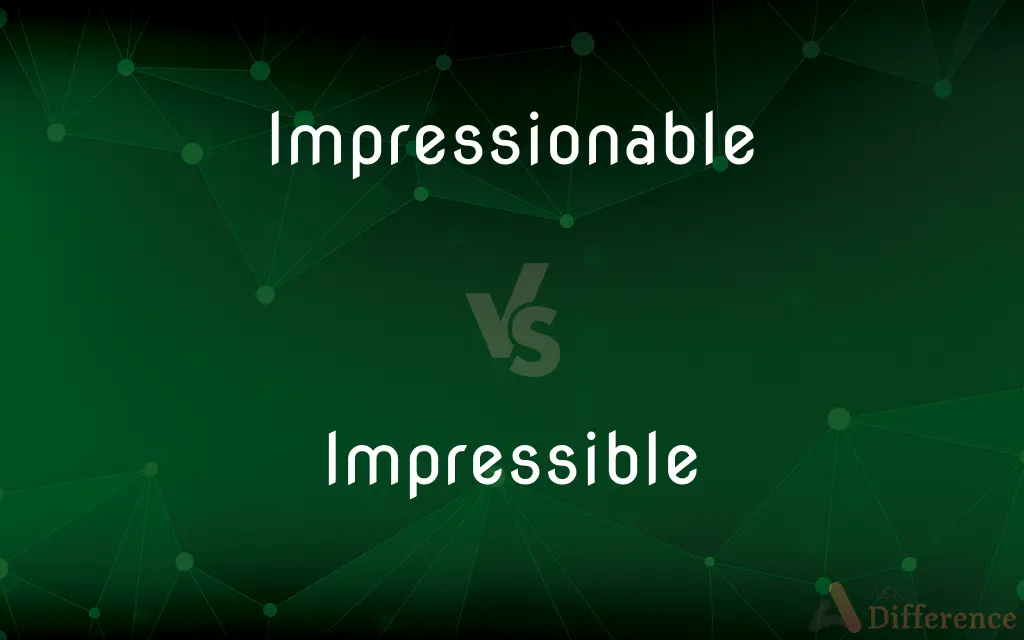Impressionable vs. Impressible — What's the Difference?
Edited by Tayyaba Rehman — By Maham Liaqat — Updated on April 1, 2024
Impressionable refers to being easily influenced due to lack of critical ability, while impressible suggests a capacity to be impressed by external factors.

Difference Between Impressionable and Impressible
Table of Contents
ADVERTISEMENT
Key Differences
Impressionable individuals often exhibit a heightened sensitivity to influence, especially from external stimuli such as media or authority figures, due to their malleable or easily swayed nature. This trait is frequently observed in children and young adults, who are still forming their views and opinions. Whereas, impressible denotes a broader capability or readiness to be impressed upon by external inputs, not necessarily implying the lack of judgment or critical thinking found in impressionable individuals.
Impressionable personalities are typically seen as more vulnerable to persuasion and suggestion, making them more susceptible to adopting new beliefs or behaviors without substantial scrutiny. This can be particularly evident in the context of peer pressure or advertising. On the other hand, being impressible can simply mean an openness to new ideas or experiences without the negative connotation of being easily manipulated. It highlights a certain receptiveness or sensitivity to impressions, which can be a positive trait when coupled with discernment.
While the term impressionable often carries a negative connotation, suggesting a weakness or deficiency in character, especially in being overly susceptible to influence, impressible does not inherently suggest a vulnerability. Instead, it underscores a capacity for receiving impressions, which can be either positive or negative depending on the context and the individual's ability to critically evaluate these influences.
The distinction also extends into the realm of emotional and intellectual stimuli. Impressionable individuals may be more likely to form strong emotional responses to persuasive communication, art, or literature, potentially leading to a rapid change in mood or opinion. Impressible, while still responsive to such stimuli, suggests a more measured and perhaps intellectual engagement with what is being presented, potentially leading to a thoughtful consideration rather than an impulsive reaction.
Understanding the nuances between being impressionable and impressible is crucial in educational and developmental contexts. Educators and parents aim to cultivate an impressible rather than an impressionable mindset in young people, encouraging openness to new information and experiences while fostering critical thinking skills to navigate these influences effectively.
ADVERTISEMENT
Comparison Chart
Definition
Easily influenced due to lack of critical ability.
Capable of being impressed by external factors.
Connotation
Often negative, suggesting vulnerability.
Neutral, indicating openness or sensitivity.
Associated Age Group
Typically children and young adults.
Not age-specific, applies to all ages.
Critical Thinking
Lacks critical thinking in the face of influences.
Does not imply a lack of critical thinking.
Emotional Responsiveness
More likely to form strong emotional responses quickly.
Suggests a capacity for emotional response without quick judgment.
Compare with Definitions
Impressionable
Prone to being influenced by external media.
Impressionable viewers might imitate risky behaviors seen in movies.
Impressible
Responsive to emotional or aesthetic experiences.
The impressible audience was moved by the performance.
Impressionable
Easily swayed by others' opinions.
The impressionable teenager adopted his friends' fashion styles.
Impressible
Capable of being easily impressed by sensory or intellectual stimuli.
His impressible mind found joy in all forms of art.
Impressionable
Lacking in critical judgment in social situations.
Her impressionable nature made her a target for peer pressure.
Impressible
Having a capacity for receiving lasting impressions.
The landscape left an indelible mark on her impressible memory.
Impressionable
Susceptible to new ideas without skepticism.
Impressionable minds often grasp revolutionary ideas quickly but uncritically.
Impressible
Open to influence but with discernment.
The impressible student was keen to learn yet questioned everything.
Impressionable
Vulnerable to suggestion and persuasion.
The salesman found young, impressionable customers the easiest to convince.
Impressible
Susceptible to physical or emotional impact.
Impressible skin might bruise or react more easily.
Impressionable
Easily influenced
Children are highly impressionable and susceptible to advertising
Impressible
Susceptible to impressions; malleable
Impressible young minds.
Impressionable
Readily or easily influenced; suggestible
Impressionable youths.
Impressible
Capable of being impressed; susceptible of receiving impression.
Impressionable
Capable of receiving an impression
Impressionable plaster.
Impressible
Capable of creating an impression. en
Impressionable
Being easily influenced (especially of young people).
Impressible
Capable of being impressed; susceptible; sensitive.
Impressionable
An impressionable person.
Impressible
Easily impressed or influenced;
An impressionable youngster
An impressionable age
Impressionable
Liable or subject to impression; capable of being molded; susceptible; impressible; as, a bad influence on impressionable youths.
He was too impressionable; he had too much of the temperament of genius.
A pretty face and an impressionable disposition.
Impressionable
Easily impressed or influenced;
An impressionable youngster
An impressionable age
Common Curiosities
Is being impressionable a permanent trait?
Not necessarily; individuals may become less impressionable as they gain experience and develop critical thinking skills.
What role does media play in influencing impressionable individuals?
Media can significantly shape the views and behaviors of impressionable individuals, emphasizing the importance of media literacy.
Can being impressible be considered a positive trait?
Yes, it denotes openness and sensitivity to influences, which can be positive with discernment.
How can educators encourage students to be more impressible than impressionable?
By fostering critical thinking and discernment, allowing openness to new ideas without easy manipulation.
What techniques can increase an individual's impressibility?
Engaging in diverse experiences and reflective practices can enhance one's openness and receptivity.
Can someone be both impressionable and impressible?
Yes, it's possible to be open to influences while sometimes lacking critical judgment, depending on the context.
Is it negative to be impressionable in all contexts?
Not always; being open to positive influences can be beneficial, but it's crucial to maintain critical oversight.
What makes someone impressionable?
Lack of experience or critical thinking skills, making them easily influenced by others.
How does age affect being impressionable or impressible?
Younger individuals are more likely to be impressionable due to less developed critical faculties, whereas being impressible is not age-specific.
Can societal norms make someone more impressionable?
Yes, societal pressures and norms can increase an individual’s susceptibility to influence.
Is it easier to influence an impressionable or an impressible person?
An impressionable person is easier to influence due to their lack of critical thinking.
How can one develop from being impressionable to impressible?
Through gaining experience, engaging in critical thinking, and learning to evaluate influences objectively.
How does being impressionable affect decision-making?
It can lead to decisions based more on external influences than personal conviction.
Can being too impressible lead to indecision?
Potentially, if one is overly open to every influence without discerning which to prioritize.
How do cultural factors influence impressionability?
Cultural norms and values can dictate what influences are deemed acceptable, affecting one’s impressionability.
Share Your Discovery

Previous Comparison
Benzenol vs. Phenol
Next Comparison
Indifferent vs. IndifferenceAuthor Spotlight
Written by
Maham LiaqatEdited by
Tayyaba RehmanTayyaba Rehman is a distinguished writer, currently serving as a primary contributor to askdifference.com. As a researcher in semantics and etymology, Tayyaba's passion for the complexity of languages and their distinctions has found a perfect home on the platform. Tayyaba delves into the intricacies of language, distinguishing between commonly confused words and phrases, thereby providing clarity for readers worldwide.












































